It’s Adoptee Month at LavenderLuz.com. In honor of National Adoption Awareness Month, spend November reading a variety of adoptee voices here. All essayists have responded to this prompt: what I wish adoptive parents knew about parenting an adoptee.
Today’s voice belongs to Brad Ewell.
Unmooring
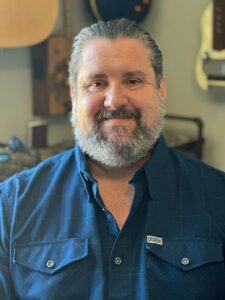
I was a 48-year-old man sitting in my office at work with tears streaming down my face.
I can still hear my dad’s fingers drumming on the steering wheel as he thought of what to say after I asked him if I was adopted, with no idea what to believe about who I was and where I came from.
There was no one to turn to because the very people I had formed my identity around had been lying to me for my entire life.
Growing Up
What growing up as a late discovery adoptee (LDA) felt like for me was almost 50 years of failure.
My adoptive parents didn’t put these feelings on me. I put them on myself as I found time and again that I wasn’t good at many of the things that came easily for them. For example, my dad played football in high school and had eventually earned a scholarship for college. I tried football in middle school and early in high school. I hated it from the day I started until the day I decided I was done with it.
My parents didn’t do anything to push me towards sports, they just weren’t honest with me about why sports might not have been for me. My parents were also both very fit people while I was not, something they made clear was not acceptable with all the diet and weight loss things they pushed me towards. This included weekly shots of who-knows-what. All I know is they didn’t help. Instead, I stayed hungry and hid food to eat when no one was around.
Finally, my parents were both off the chart extroverts while I can be pathologically introverted. I did my best to fade into the scenery while they pushed me towards the spotlight.
After the Discovery
Once I learned the truth about being adopted, I began connecting with my biological family. These connections allowed me to find peace with and make sense of who I am and where my interests and talents lie.
My biological family is filled with introverts and artists. My biological father draws, paints, and does wood turning, creating beautiful bowls and vases. My biological mother died 19 years before I knew she existed, but I’ve learned from her family that she was artistic as well, crocheting and making all kinds of crafts. I also learned she was a talented writer after reading a letter she wrote to cancer shortly before her death.
These discoveries led me to embrace my artistic side. I write, dabble in guitar and piano, and have fun with photography. It turns out you can teach an old dog new tricks, but this old dog wishes he’d had the chance to do these things years earlier.
How Adoptive Parents Can Do Better
I am from the tail end of the baby scoop era, a time where hidden/closed adoptions where the norm. I’m thankful we now find ourselves in an era where open adoption is understood as better for the adoptee.
Listening to Adoption: The Long View lately, I’ve come to a new understanding of openness. I always thought of openness as contact with biological family. Now I understand while contact can be a part, the other integral piece is the adoptive parents being open to talking with their child about adoption.
For adoptees’ emotional health they must have openness from their parents. This can be displayed as a willingness to explore the biological connections your child has with their first family or just being willing to honestly answer the child’s questions about adoption. This puts more work and may be uncomfortable for the adoptive parents, but it makes all the difference for the adoptee.
The plus side of this work for adoptive parents is that your child will likely thank you for it for the rest of their lives. Adoptive parents also don’t want to be the ones who withheld or didn’t try to gain this knowledge for their child when it was possible. Even if your adopted child doesn’t want to know the information later, you want to do everything in your power to have this information for your child. Ultimately it will fall to you to explain to your child the amount of knowledge available about their first family.
Adoptees Count on Adoptive Parents to Be Willing to Explore
In cases where there’s no contact with the first family, do anything you can to learn about them: what are their interests, talents, and personalities? If the biological parents aren’t available, dig deeper, look for grandparents or aunts / uncles. In cases where no contact is possible, be ready to help your child with a lot of exploration. This is something my parents didn’t know how to do. I was a quiet adoptee following in my parent’s footsteps but coming nowhere close to finding myself. Without you encouraging this exploration the adoptee may be like me and not feel safe deviating from what they see as the family norm.
The ability to finally see where I came from and understand the reasons, I am the way I am has given me a peace I’ve never known. To be able to give myself the space to enjoy things that have been calling me for my entire life allows my mind to rest. After years of fighting my interests, this is a new experience for me. I find myself in a state of flow where things make sense and come easier than I am used to. I finally find myself at peace.
About Brad Ewell
Brad Ewell is a husband, father, writer, police officer, and late discovery adoptee. He made his adoption discovery in 2019 at 48 years old. Since that time he was written micro memoirs and an article published in severancemag.com and been interviewed in several podcasts.
Brad is in reunion with several members of his biological family and been an advocate for his fathers release from prison. His writing and podcasts can be found at https://linktr.ee/LDA_BRAD. and you may follow him on Instagram.
- Love With A Big Love by Danielle Gaudette
- What I Wish You Had Known While Raising Me by Emma Stevens
- The Green Binder by Cynthia Landesberg
- A Simple Question with Many Answers by Rebecca Cheek
- Happy Birthday by Roberta Holland
- Don’t You Know We Love You? by Lorah Gerald
- Why My Truth Matters More Than Your Comfort by Brad Ewell
- Being Open is the Right Path by Allison Olson
- Adoptees on Adoption 2022 entire series
- Adoptees #flipthescript 2014-2016
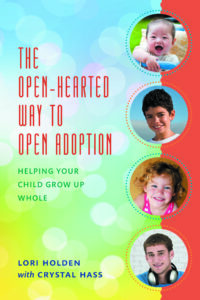
Lori Holden, mom of a young adult daughter and a young adult son, writes from Denver. She was honored as an Angel in Adoption® by the Congressional Coalition on Adoption Institute.
Her first book, The Open-Hearted Way to Open Adoption: Helping Your Child Grow Up Whole, makes a thoughtful anytime gift for the adoptive families in your life. Her second book, Standing Room Only: How to Be THAT Yoga Teacher is now available in paperback, and her third book, Adoption Unfiltered, is now available through your favorite bookseller!
Find Lori’s books on her Amazon Author page and catch episodes of Adoption: The Long View wherever you get your podcasts.



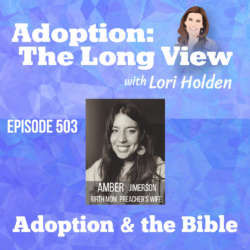
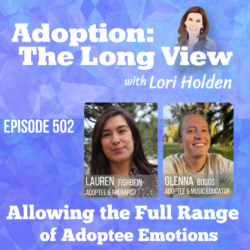
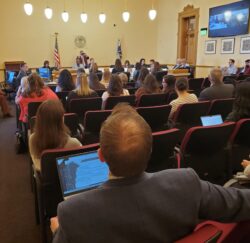
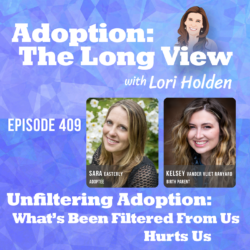

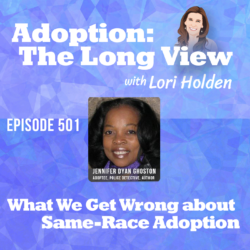
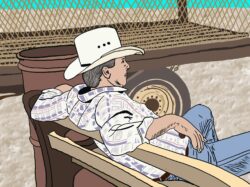
3 Responses
I’ve been reading all of these posts. I am an adult adoptee. I feel the pain in every post. Does open adoption really make things better? I think I need to hear from younger adoptees, who feel adoption was good for them.
You bring up a really good point, Marylee. Does “open adoption” address any of the issues inherent in adoption?
My guess is “not necessarily.” You can have contact in adoption without actually having openness. And vice versa. What really matters, as so many adoptees have told me, is openness, the ability of an adoptive parent to talk with an adoptee about adoption with presence and authenticity. In other words, to Be There for an adoptee.
I do look forward to hearing from adoptees who were raised in “open adoptions” — but I will bet we find that adoptees who have parents who could Be There and Go There with them, whatever and wherever that means, are the ones who feel most connected with their parents (all of them), and are able to explore their adoptedness with them.
Thanks for reading this Marylee. Obviously I’m not the person to answer your question. But, I’ve spoken to several adoptees from all ranges of the open to closed adoption spectrum. What I believe is that even the adoptees that had open adoptions had their own struggles. They are still growing up after being separated from their biological roots. But, the ones that had adoptive parents that were open to the hard talks and feelings had adopted kids that felt more secure in all their attachments than the ones who had parents that were closed like mine.